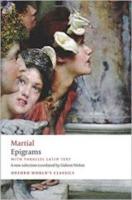
OUP (2015) £9.99 290pp (ISBN 9780199645459)
This attractive paperback in the Oxford World’s Classics series presents an anthology of Martial’s epigrams in the same format as James Michie’s Penguin, a parallel text with Latin faced by the English version. There is however a considerable difference between the poems selected, so this new edition complements rather than replaces the older one.
N. begins with a very helpful and readable introduction, beginning with a brief outline of Martial’s life. The genre of epigram is discussed: its beginnings in Greek followed by M.’s innovations, in particular the importance of the arrangement of poems in M.’s books with their intertwining themes. Unlike previous collections which were arranged by subject matter, M. provided variatio—an appearance of chaos which was in fact a ‘carefully judged mix of poems that keeps surprising the reader’. Each book begins with an introductory poem, sometimes poems that point a reader through the book (3.86 warning a casta ‘bashful lady’ that the subject matter might be risqué) and concluding poems. N. suggests that we should therefore consider M’s poems as a work of literature—indeed, the arrangement in 12 books might allude to Virgil’s Aeneid.
The introduction also discusses M.’s portrait of the city of Rome, his contribution to the genre of satire, the fifteen extant books with some typical themes and an account of M.’s waxing and waning fortunes in the centuries since his day. Napoleon had a fatal effect on M.’s popularity in England—if the French like him (because of his striving for point and effect), patriotic Englishmen must despise him.
We then move on to 240 pages of epigrams. N. acknowledges the impossible pressures on an anthologiser: to show M’s originality but also the literary influences on him, to make his world seem excitingly different while also showing him as ‘one of us’, to avoid duplication but also to show his variations on a theme. For each book N. includes around 25 poems out of a total of around 90. In keeping with modern frankness, there are many poems which are considerably more racy than those in Michie’s Penguin, thus filling out the picture of M.’s satirical invective.
The parallel translation is in prose not verse, enabling N. to convey more of his ‘devilish detail’ and ‘deft comic timing’. This yields a fairly close translation which would enable rusty Latinists in most cases to enjoy the poems in Latin as well as English. Occasionally there are problems with the text: a pesky nec that has fallen out of 3.11 (not only here but on some on-line versions of the text as well), dereriore for deteriore in 3.19.
There are minimal notes in the back of the book, which are very helpful. However, their brevity sometimes leaves the reader still uncertain about M’s allusions and jokes, and I would have appreciated more detail in this area.
In spite of these niggles, this is an attractive and approachable volume, a very good introduction to M. for classicists and non-specialists alike.
Hilary Walters
